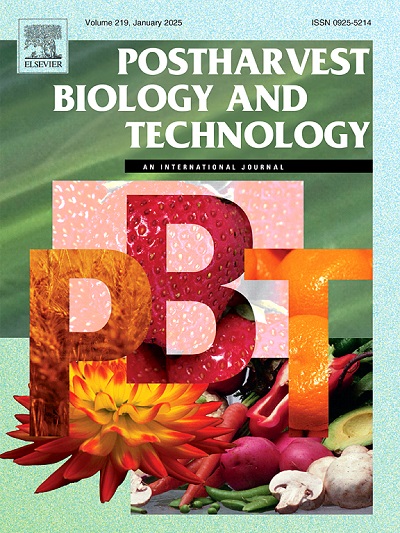Overexpression of SlIMP3 regulates sugar metabolism, antioxidant activity, and fruit softening, leading to extended shelf life of tomato fruits
IF 6.4
1区 农林科学
Q1 AGRONOMY
引用次数: 0
Abstract
During the postharvest storage of tomato fruits, they often shrink or even rot due to water loss or infection by pathogenic bacteria, leading to significant economic losses in the tomato fruit industry. Inositol monophosphatase (IMP) is involved in inositol synthesis, which serves as a precursor for the synthesis of cell wall polysaccharides and is also involved in ascorbic acid synthesis. Overexpression of SlIMP3 in tomato has been shown to delay fruit softening, but the mechanism by which SlIMP3 regulates fruit softening remains unclear. In this study, the transcriptome and metabolome of wild-type tomato fruit (WT) and SlIMP3 overexpressing tomato fruit were thoroughly analyzed at 0, 15 and 26 days of storage. A total of 83 differential metabolites were identified, and more than 2000 genes exhibited changes during storage and in SlIMP3-OE tomato fruits. KEGG pathway enrichment analysis revealed that the differential genes were mainly related to metabolic pathways and the biosynthesis of secondary metabolites. Metabolome analysis showed that various sugars (lythreon, glucose, cellobiose, allulose, etc.) and antioxidants (melatonin, 3,4-dihydroxymandelic acid, dihydroquercetin, salicylic acid) underwent significant changes during storage. Significantly, most genes associated with cell wall degradation (SlEXP1, SlPL, SlPG2, SlTBG4, SlXYL1, SlXTH5) were downregulated in SlIMP3-OE compared to the wild type. Two-omics analysis indicated that overexpression of SlIMP3 regulated the accumulation of many carbohydrates and antioxidants and the expression of related anabolic genes during storage of tomato fruits. In conclusion, overexpression of SlIMP3 affects tomato fruit softening through the modulation of carbohydrate and antioxidant metabolism, concurrently regulating the expression of genes associated with cell wall metabolism. This study provides new theoretical insights and potential methods for improving fruit quality and reducing postharvest loss.
求助全文
约1分钟内获得全文
求助全文
来源期刊

Postharvest Biology and Technology
农林科学-农艺学
CiteScore
12.00
自引率
11.40%
发文量
309
审稿时长
38 days
期刊介绍:
The journal is devoted exclusively to the publication of original papers, review articles and frontiers articles on biological and technological postharvest research. This includes the areas of postharvest storage, treatments and underpinning mechanisms, quality evaluation, packaging, handling and distribution of fresh horticultural crops including fruit, vegetables, flowers and nuts, but excluding grains, seeds and forages.
Papers reporting novel insights from fundamental and interdisciplinary research will be particularly encouraged. These disciplines include systems biology, bioinformatics, entomology, plant physiology, plant pathology, (bio)chemistry, engineering, modelling, and technologies for nondestructive testing.
Manuscripts on fresh food crops that will be further processed after postharvest storage, or on food processes beyond refrigeration, packaging and minimal processing will not be considered.
 求助内容:
求助内容: 应助结果提醒方式:
应助结果提醒方式:


